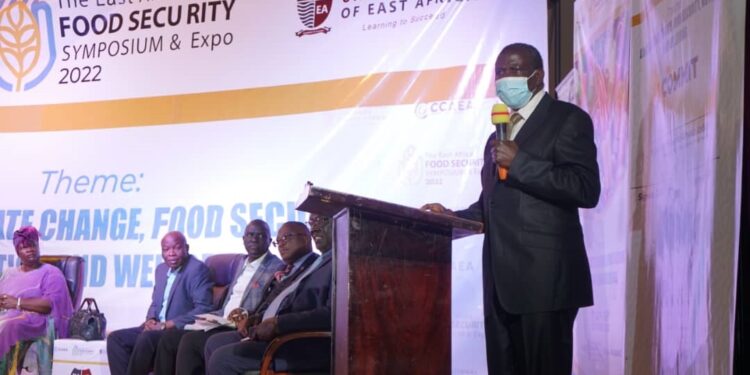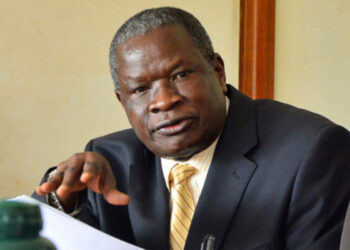Uganda will next month host the first-ever regional climate change and food security symposium and expo as experts sit to discuss the impact of climate change on food security in the region.
Organised by Climate Change Action East Africa (CCAEA) and the International University of East Africa (IUEA), symposium and expo to be held between October 14 and 16 at the IUEA, Kampala campus, Kansanga – Ggaba Road, the three day event will be an avenue to promote awareness of the linkages of the impacts of climate change to the food security issue.
It will also promote open discussion within the food production chain and systems with a focus on safeguarding communities from hunger in Uganda, the East Africa region, Africa and the world as a global village facing the same challenges.
According to organisers, climate adaptation and resilience initiatives which can be enhanced and reinforced in Uganda and East Africa as a region will be high on the agenda at the symposium and expo.
The technologies that will be exhibited will be critical to current practitioners and new entrants to the food chain systems and climate change solution pool.
“We have decided and planned to hold food security symposia and expos annually in the capitals of the EAC partner states as the most imperative way of promoting awareness of climate change impacts for consequential energization of countries to plan and budget for climate change impact and as well implement their national commitments,” Dr. Tom Okia OKurut, the Executive Director of the Climate Change Action East Africa said.
“Climate change issues in the region are well discussed given that Uganda and all the countries in the EAC region are parties to the United Nations Framework Convention on Climate Change (UNFCCC)”.
Okurut explained that all the regional countries, adaptation to climate change impacts is the main response strategy given the low emissions from the region.
“However, what is observable is that the sectorial approaches; forests, water, and environment perspectives dominate the discourse Food insecurity linkages to climate change don’t come out prominently and as such, government planning for climate change impact interventions focuses on directly impacted aspects,” OKurut added.
Ronald Robert Lwabaayi, the Team Leader at Climate Change Action East Africa said,“ The overall aim of holding the symposium and expo is to increase climate change resilience and food security awareness in East Africa. Especially, the event is expected to increase understanding of the risks associated with climate change on food systems and natural hazards, promote the application of early warning systems to reduce humanitarian and extreme impacts of climate change on society and increase adequacy and effectiveness of adaptation and resilience actions, including the extent to which they advance food crisis insecurity in the region.”
According to Lwabaayi,the symposium and expo will provide a platform for climate-smart technologies exposure and engagement but also facilitate smallholder farmers to showcase their product and share their innovations in response to the challenges impacting farmers.
According to the first-ever climate change and food security symposium and expo will be an opportunity for the International University of East Africa introduce to the general participants of the symposium the ESUS, an online platform where farmers will access quality seeds, access climate updates, hire electric tractors and also track their produce.
“We are thrilled to provide an opportunity for interaction and engagement among those involved in the food chain systems such as farmers, transporters, cold food chains, and agro-industrial sectors among others in the identification of gaps and finding local solutions for climate change-driven food insecurity. A special session for farmers to present their innovations and technological solutions is part of this symposium,” said Hassan Alwi, the chairperson, commercialization of innovations at IUEA.
Prof. Emeka Akaezuwa, the Vice Chancellor of IUEA said, “As strong believers in offering transformational experience for our students and stakeholders, the symposium will provide an arena for open discussion and knowledge sharing on the aspects of climate change, and food security among the wide range of participants from the Private sector, Academia, Development Partners, Institutions, Agricultural Sector Energy Sector, and Climate Change actors and Environment promoters, Government and Civil Society Organizations.”
According to Finance Minister Matia Kasaija, who presided over the unveiling event, “many parts of East Africa in the past year have been experiencing hunger due to acute food shortages. The recent images from the Karamoja sub-region in Uganda attest to this. But food distribution logistics and extreme poverty may be the main drivers given the availability of food in the markets and the other parts of the country. Nevertheless, food insecurity occurrences signal a failure or absence of strategic response systems including food insecurity threat detection, storage, transportation, distribution, processing, seed preservation and effective utilization of food.”
“The fluctuations of food production and availability due to climate change impacts can only, therefore, be mitigated if the smallholder farmer’s productive capacity and productivity are deliberately enhanced. The Uganda government is now focusing attention on climate change that is driving food insecurity through the introduction of specific strategies for farmers such as investing in micro-scale irrigation schemes and taking over seed production.”
The event will also recognize climate change champions across the region.
Do you have a story in your community or an opinion to share with us: Email us at editorial@watchdoguganda.com













